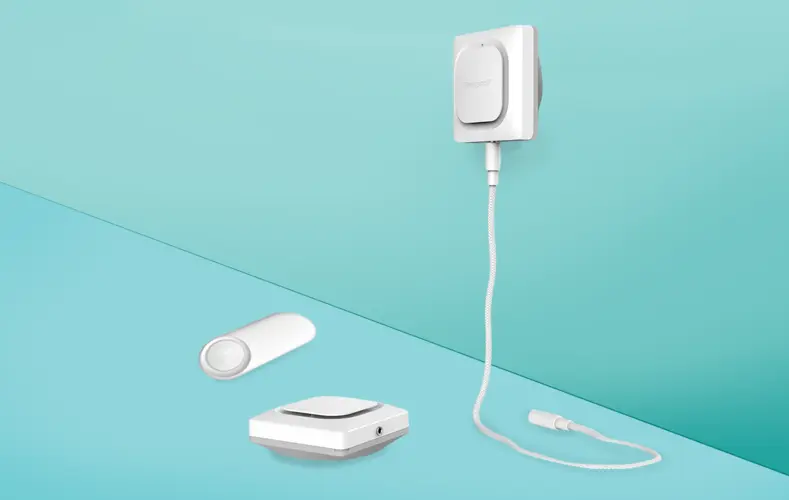Are you aware of the consequences of Leaking your home with water? How does a water leak detector work? Just imagine that while you are not at home, the dishwasher breaks down and leaking water leaks onto the kitchen floor.
You’re gone for a few hours, so wooden cabinets absorb moisture, just like the floor and nearby furniture. And what if you live in an apartment building? Then you Leak your neighbour’s basement.
Add up the costs of replacing equipment, furniture, and renovation. A lot? And it would be enough to install a water leak detector. Find out what it is and how it works by reading the article.

Image – How does a water leak detector work?
Contents
What is a water leak sensor?
A water leak sensor or detector is a small device that can protect you against quite large renovation costs, furniture replacement, and equipment replacement.
A small, intelligent leak sensor will allow you to significantly reduce the risk of losses related to uncontrolled water leakage.
You can buy it as an autonomous device that you can install near the source of a potential leak, i.e. next to the washing machine, dishwasher, or other water draws, or install it as one of the elements of an extensive alarm system in your home.
When it comes to appearance, there is nothing special about it. A water Leak sensor is, simply put, an electronic board with a sensor, a buzzer or speaker and an LED, mounted in a simple housing.
Autonomous devices, i.e. those that you simply buy and install on the floor, usually operate on batteries and are equipped with a buzzer or loudspeaker that emits a sound signal when water is detected.
In turn, the Leak sensor that you connect to the alarm system in your home is a wired sensor that connects to the alarm control panel via a cable (or wirelessly) and draws power from the electrical network.
Both solutions have their advantages, although we personally believe that the second one has much more of them.
How does a water Leak detector work?
The operation of the Leak detector is quite simple. This device is equipped (or is equipped separately) with a probe with electrodes located near the floor.
When the electrode comes into contact with water, the detector activates the alarm and at this point the role of a regular detector ends. It emits a sound signal that is audible at a short distance from the device.
This means that there must be household members nearby who will hear and react appropriately. In turn, a Leak detector, which is part of the alarm system, can do much more.
The Leak detector in the alarm system connects to the control panel , so when a water leak is detected, it sends an event pulse to it.
The control panel, in turn, can activate all sirens in the building and send an event notification to the phones of configured users. This is a big advantage over a regular detector.
Thanks to this option, even if you are on the second floor or completely away from home, you will know that the sensor has detected the presence of water on the floor surface and you will be able to return or remotely direct help to reduce the risk of loss and damage that this may cause Leaking.
What are the features of a good water Leak detector?
The Leak detector, like any other sensor in the alarm system, is responsible for detecting an event that may cause significant losses and damage.
We can therefore say that a good detector is one that is able to detect even a small amount of water, and also reacts immediately and activates the alarm. It is also worth paying attention to how the detector is able to detect water. For example, some models are better than others at detecting it on uneven surfaces.
In addition, Leak detectors can also be equipped with additional functions , such as temperature monitoring. But that’s not all. There are also very advanced detectors with relays, but more about them in a moment.
How to choose a water Leak sensor?
The choice of water Leak sensor should be based on your needs. First of all, consider whether an autonomous device is enough for you, or whether a sensor that is part of the alarm system will be better.
Then determine whether you can connect it with wires to the alarm control panel or whether chipping away the plaster in the walls is not an option, and based on that, choose a wired or wireless solution.
Finally, analyze all the places where it should go.
Pay attention to rooms that are particularly at risk of water leakage, i.e. all those with taps and water intake devices, such as a dishwasher, washing machine, etc.
Most often, Leak sensors are installed in the kitchen and bathroom, but in some houses they also appear in the basement or even on the attic. Once you have determined all your needs, please note that Leak detectors are divided into two types.
Types of water Leak detectors
Although the task of each sensor is to detect water, not everyone is able to send notifications to phones or mobile devices. Just as not every detector is able to stop a leak, and in this respect, we can divide water Leak sensors into:
- detectors without relay;
- detectors with relay.
Detectors with a relay are devices that are able to send an impulse to the solenoid valve, informing about a leak. The solenoid valve that receives such an impulse will automatically cut off the water supply. This is perfect protection for interiors against Leaking. Such a solenoid valve is installed at the water inlet.
Protect your home against water leaks
Although the Leak detector is most often installed next to household appliances, it can be used anywhere.
We also recommend installing it in a room with an aquarium. In addition, it is perfect for bedrooms with e.g. a waterbed.
You already know how a Leak detector works, but you may still not know which solution to choose. Contact us
We will provide you with comprehensive information about these devices and help you choose the right detector. Remember that prevention is always better than counting the costs after the event.
FAQs
Where should I place a water leak detector in my home?
Water leak detectors are best placed near areas prone to leaks or flooding, such as under sinks, near appliances like washing machines, and in basements.
Can a water leak detector prevent damage from leaks?
While it cannot prevent leaks, a water leak detector can provide early warning, allowing you to address the issue before significant damage occurs.
Are there different types of water leak detectors available?
Yes, there are various types of water leak detectors, including standalone units, those integrated with smart home systems, and even ones that can shut off the main water supply.
Do I need Wi-Fi for a water leak detector to work?
Some advanced models may require Wi-Fi for remote monitoring and notifications, but basic models function without Wi-Fi.
How long do water leak detectors last?
The lifespan of a water leak detector varies depending on the model and usage but generally lasts several years before needing replacement.
Are water leak detectors easy to install?
Most water leak detectors are simple to install and require minimal setup, making them accessible for homeowners with basic DIY skills.
Read Also –
- Transform Your Backyard Oasis: Hot Tub Privacy Solutions | backyard hot tub privacy ideas
- 10 Tips for choosing your Hot Tub
- How to winterize your pool?
- How to Naturally Clean Your Pool Water
- Detect an Underground Water Main Leak

My name is James A. Bright, and I have worked in the pool and plumbing industries for over 15 years. I started poolprosoutions.com to share my experience with you guys. Here, I provide helpful guides and tips related to pool care, hot tub care, underground water leaks, and pipe leaks.



